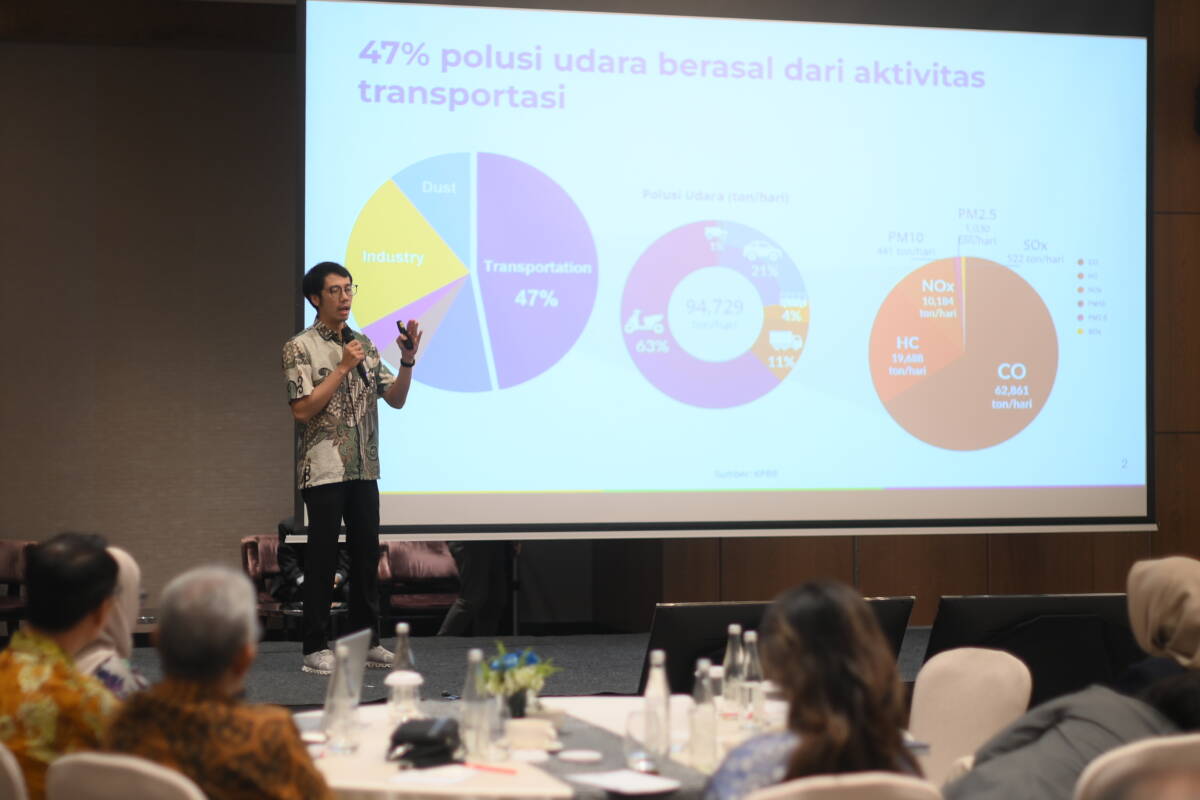Jakarta, November 19, 2024 – The transportation sector is one of the main contributors to air pollution in Indonesia due to the use of low-quality fuel oil (BBM). To improve air quality, the government needs to tighten the quality of fuel sold in Indonesia.
The Institute for Essential Services Reform (IESR), a think tank on renewable energy and the environment, together with the Center of Reform on Economics (CORE Indonesia), the Committee for the Elimination of Leaded Gasoline (KPBB), and the Research Center for Climate Change at the University of Indonesia (RCCC-UI) on Tuesday (19/11/2024) launched a study “Analysis of the Impact of the Policy on Tightening Fuel Quality Standards on Environmental, Health, and Economic Aspects.” The study shows that tightening fuel quality standards (BBM) equivalent to Euro IV can have an impact on reducing air pollution, improving the quality of public health, and reducing social and economic costs caused by increased health costs, lost economic opportunities, and environmental damage, as well as supporting economic growth.
The Executive Director of IESR, Fabby Tumiwa explained that around 45 percent of air pollution in Jakarta comes from the transportation sector. Fabby revealed that the majority of fuel in the Indonesian market, such as Pertalite and Pertamax, has low quality as indicated by sulfur content reaching 150-400 ppm, far above the Euro IV standard. Sulfur is a natural component of crude oil found in gasoline and diesel. When burned, sulfur produces emissions in the form of sulfur dioxide (SO2). For this reason, he encouraged the reduction of sulfur content by tightening fuel quality standards, such as implementing Euro IV which limits sulfur to a maximum of 50 ppm.
“Air pollution causes economic losses that increase health costs, lower public productivity and environmental damage. Based on a World Bank report, air pollution in Indonesia reduces the country’s GDP by around US 220 billion or about 6.6 percent per year. If we want to achieve eight percent economic growth, as envisioned by President Prabowo, then the government needs to seriously address this air pollution problem,” Fabby said in his speech.
He revealed that the implementation of Euro IV and higher standards requires relatively large investments in fuel processing technology, as well as updating oil refinery infrastructure. However, these costs will be paid off by improvements in air quality, which will result in reduced health costs and economic growth that is far more significant than the investment incurred.
Prof. Budi Haryanto, Chairman of RCCC UI, said that in Jakarta, the total cases of air pollution-related diseases, such as ARI, asthma, inflammation and lung infections, reached 175,000 to 599,000 cases in the 2016-2021 period. The total medical expenses claimed through BPJS in the same period reached Rp191 million to Rp1.8 billion in the same period.
“Cleaner air quality will reduce the risk of hospitalization and medical costs related to pollution-related diseases. By promoting higher fuel quality, it can protect public health while reducing the economic burden caused by long-term medical expenses,” Prof. Budi said.
Julius Christian, Senior Analyst of IESR, who is also one of the authors of the study, revealed that the study found that the implementation of Euro IV fuel standard can significantly reduce the air pollution burden in Jabodetabek. This implementation is able to reduce emissions of pollutants such as CO, NOx, SO2, as well as PM2.5 and PM10 concentrations by more than 80 percent. In addition, upgrading fuel quality to Euro IV standards also has the potential to reduce more than 50 percent of diseases caused by air pollution. In terms of health, this step can save medical costs of up to Rp550 billion per year, just for Jakarta.
“The implementation of Euro IV fuel will increase the cost of fuel production, which can be covered by the government through an increase in the subsidy budget. Without compensation through subsidies, it can trigger an increase in inflation. Alternatively, the government can implement restrictions on access to subsidized fuel so as to save the budget and limit the impact of inflation to some segments of society,” Julius explained.
The study recommends five measures to improve air quality and reduce emissions in the transportation sector. First, create a comprehensive policy with stricter fuel quality standards. The Ministry of Energy and Mineral Resources needs to immediately issue rules for motor vehicle fuel specifications that are in line with Permen LHK No. 20/2017, which requires fuel specifications to meet the needs of Euro IV vehicle engine technology.
Second, the government needs to develop regulations and roadmaps for further tightening of motor vehicle emission quality standards. This tightening, up to Euro VI standards, will support the competitiveness of the automotive industry in a global market that increasingly prioritizes stricter emission standards.
Third, strengthen supervision and law enforcement related to the implementation of Euro IV standards and increase public education on the importance of low-emission fuels and vehicles.
Fourth, improving fuel oil processing and distribution infrastructure. Pertamina needs to invest to improve its refinery capabilities, either through cooperation with private business entities through the Government and Business Entity Cooperation (PPP) scheme or through state investment (PMN). In addition, around 30 percent of fuel in the market comes from imports, so shifting imports to fuel that meets Euro IV requirements can be a short-term solution.
Fifth, encourage the use of public transportation and environmentally friendly vehicles as well as eco-based traffic management.

